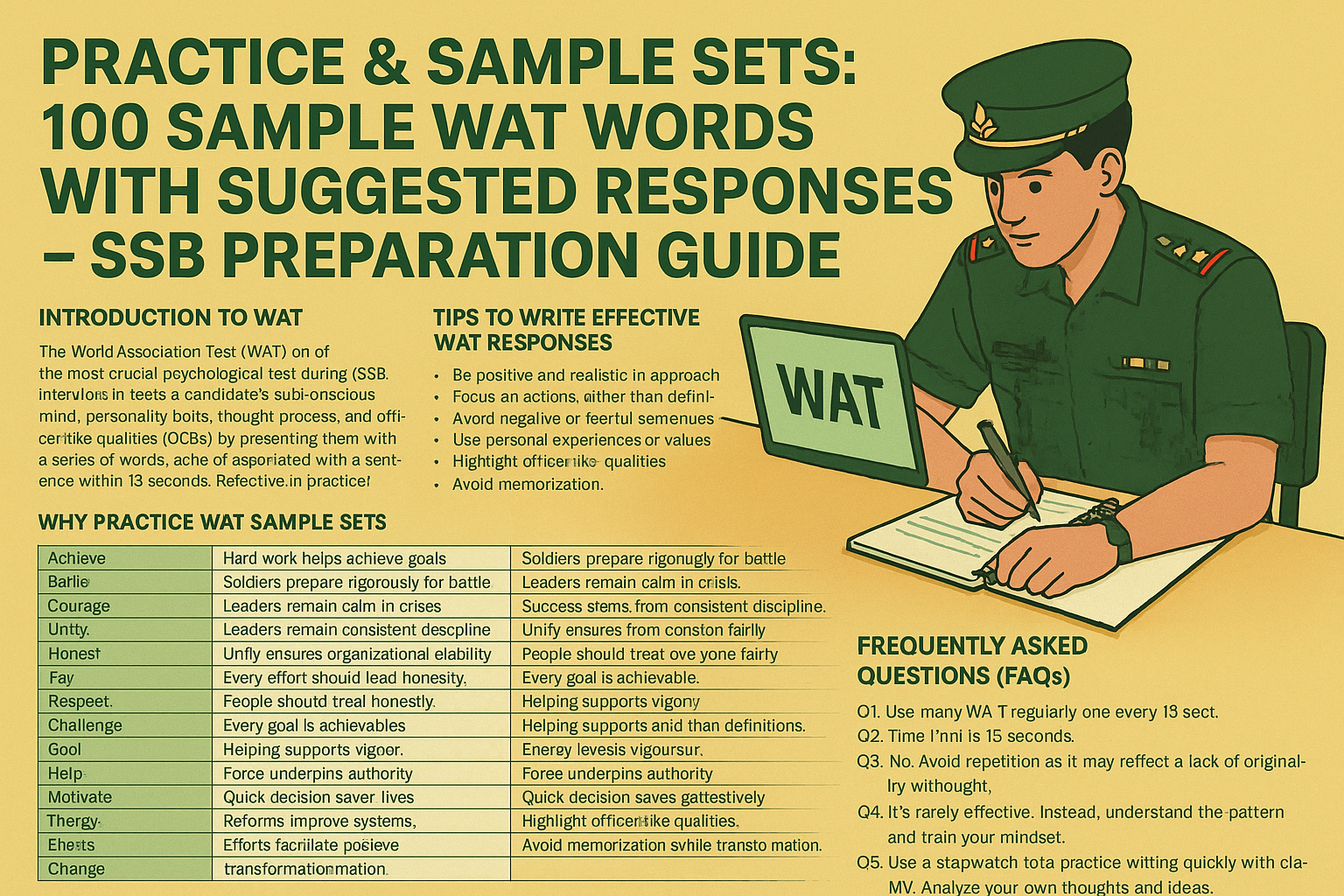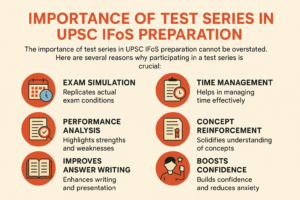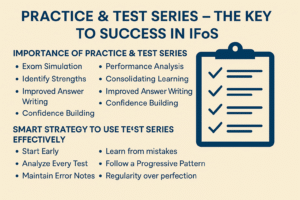INTRODUCTION TO WAT (WORD ASSOCIATION TEST)
The Word Association Test (WAT) is one of the most crucial psychological tests conducted during the SSB (Services Selection Board) interview. It tests a candidate’s subconscious mind, personality traits, thought process, and officer-like qualities (OLQs) by presenting them with a series of words, each of which they must associate with a sentence within 15 seconds.
Understanding and practicing WAT is essential for candidates appearing for NDA, CDS, TES, AFCAT, or other defense entry SSBs.
WHY PRACTICE WAT SAMPLE SETS?
Enhances spontaneous thinking
Develops clarity and positivity in responses
Builds familiarity with high-frequency WAT words
Sharpens time management under pressure
Reflects values like leadership, discipline, and responsibility
TIPS TO WRITE EFFECTIVE WAT RESPONSES
Be positive and realistic in your approach
Focus on actions, not definitions
Avoid negative or fearful sentences
Use personal experiences or values if possible
Highlight officer-like qualities subtly
Don’t memorize; train your mindset
100 WAT SAMPLE WORDS WITH SUGGESTED RESPONSES
| WAT Word | Suggested Response |
|---|---|
| Achieve | Hard work helps achieve goals. |
| Battle | Soldiers prepare rigorously for battle. |
| Calm | Leaders remain calm in crisis. |
| Courage | Courage drives change in society. |
| Discipline | Success stems from consistent discipline. |
| Unity | Unity strengthens team performance. |
| Respect | Mutual respect builds strong relationships. |
| Truth | Truth is the foundation of trust. |
| Challenge | Every challenge brings a new opportunity. |
| Help | Helping others creates positive impact. |
| Loyalty | Loyalty ensures trust in leadership. |
| Peace | Peace brings progress and prosperity. |
| Knowledge | Knowledge empowers decision-making. |
| Time | Time management enhances efficiency. |
| Vision | Vision guides long-term success. |
| Honest | Honest actions gain lasting respect. |
| Nation | Serving the nation is a noble duty. |
| Fail | Failures teach essential lessons. |
| Adapt | Smart leaders adapt to situations. |
| Inspire | True leaders inspire their teams. |
| Team | Teamwork achieves common goals. |
| Goal | Focus leads to goal achievement. |
| Strength | Inner strength overcomes adversity. |
| Trust | Trust strengthens team dynamics. |
| Lead | A leader leads by example. |
| Learn | Learning never stops in life. |
| Brave | Brave hearts never retreat. |
| Motivate | Good mentors motivate performance. |
| Obey | Obedience ensures discipline. |
| Alert | Being alert prevents mishaps. |
| Service | Service to others is service to God. |
| Integrity | Integrity defines true character. |
| Think | Great leaders think ahead. |
| Quick | Quick decisions save lives. |
| Safety | Safety is everyone’s responsibility. |
| Smart | Smart work improves outcomes. |
| Win | True spirit lies in how you win. |
| Persist | Persistence guarantees success. |
| React | React with logic, not emotion. |
| Fear | Courage conquers fear. |
| Focus | Focus leads to excellence. |
| Duty | Duty above self is patriotism. |
| Guide | Seniors guide juniors towards success. |
| Manage | Leaders manage resources efficiently. |
| Plan | Good planning saves time. |
| Care | Caring builds strong bonds. |
| Value | Good values shape character. |
| Confidence | Confidence is built through preparation. |
| Observe | Sharp observation leads to clarity. |
| Speak | Speak only what is necessary. |
| Execute | Execution converts plans into results. |
| Train | Training improves performance. |
| Friend | Friends support each other always. |
| Resolve | Strong resolve wins wars. |
| Initiative | Initiative distinguishes a true leader. |
| Energy | Positive energy inspires teams. |
| Overcome | Willpower helps overcome obstacles. |
| Progress | Progress comes through hard work. |
| Improve | Improvement is a daily goal. |
| Respect | Respect enhances unity. |
| Listen | Great leaders listen first. |
| Patient | Patience builds understanding. |
| Change | Change drives innovation. |
| Save | Save time, use it wisely. |
| Alert | Alertness prevents accidents. |
| System | A strong system ensures consistency. |
| Grow | Challenges help individuals grow. |
| Vision | Clear vision ensures steady progress. |
| Perform | Perform every duty sincerely. |
| Result | Right efforts bring right results. |
| Skill | Skill development ensures efficiency. |
| Selfless | Selfless acts build trust. |
| Fight | Fight till the last breath. |
| Duty | Fulfilling duty is a soldier’s pride. |
| Guard | Guarding the nation is a privilege. |
| Rise | Rise above fear and doubt. |
| Passion | Passion fuels excellence. |
| Balance | Work-life balance maintains health. |
| Truth | Speaking truth earns trust. |
| Action | Timely action avoids regret. |
| Freedom | Freedom must be protected always. |
| Kindness | Kindness strengthens humanity. |
| Fearless | Be fearless in your pursuits. |
| Support | Teams win with mutual support. |
| Reform | Reform begins with one step. |
| Effort | Sincere effort never fails. |
| Order | Order brings discipline. |
| Alert | Be alert, act fast. |
| Brave | Brave acts inspire generations. |
| Fight | Fight for justice always. |
| Wise | Wise choices define success. |
| Hope | Hope keeps the spirit alive. |
| Command | Command with fairness and clarity. |
| Ready | Always ready for challenges. |
| Lead | Lead from the front. |
| Endure | Endure pain, win glory. |
| Tolerate | Tolerance builds strength. |
| Accept | Accept failure and learn. |
| Build | Build trust through actions. |
| Initiative | Take initiative without waiting. |
CONCLUSION
Practicing WAT regularly not only prepares you for the SSB interview but also shapes a positive and disciplined mindset, reflective of future officers in the armed forces. With these 100 WAT sample words and responses, you’ll be able to train your mind to react positively and constructively within the 15-second window.
FREQUENTLY ASKED QUESTIONS (FAQs)
Q1. How many WAT words are given in the SSB?
You are given 60 words in total, one every 15 seconds.
Q2. What is the time limit to write a WAT sentence?
You have 15 seconds to read the word and write a sentence.
Q3. Can I write the same sentence again for different words?
No. Avoid repetition. It shows lack of originality.
Q4. Should I memorize WAT sentences?
Not recommended. Instead, understand patterns and train your thinking.
Q5. How to practice WAT effectively?
Use a stopwatch
Write quickly with clarity
Analyze your own thoughts
Use sample sets like this one










